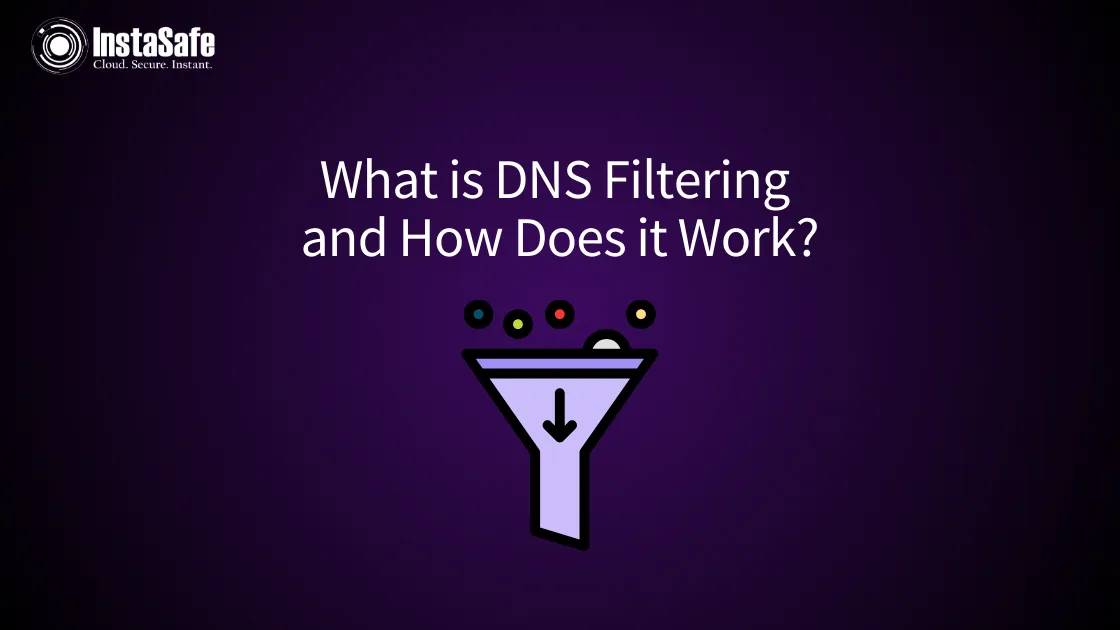What is DNS Filtering and How Does it work?

DNS filtering is a cybersecurity technique that blocks access to malicious or unwanted websites by intercepting and inspecting DNS queries. It operates at the Domain Name System level, categorising websites based on content and cross-referencing against predefined policies.
If a requested site violates policies, the DNS filter blocks access, preventing users from accessing harmful or undesirable online content.
This comprehensive guide explores how DNS filtering works, its benefits and limitations, and how it differs from traditional web filtering techniques for securing networks and enforcing acceptable usage policies.
What is DNS filtering?
DNS filtering is a cybersecurity technique that blocks access to certain websites, webpages, and IP addresses by intercepting and inspecting DNS queries before they are resolved. It works at the Domain Name System (DNS) level, which translates human-readable domain names into IP addresses that computers can understand.
DNS filtering categories websites based on their content and cross-references them against predefined policies or blacklists. If a requested website violates the organisation's policies, the DNS filter blocks access to that website, preventing users from accessing malicious or unwanted online content.
By controlling the DNS resolution process, DNS filtering serves as an effective first line of defence against cyber threats and helps enforce acceptable usage policies.
DNS and Its Role
Before understanding how DNS filtering works, let's first understand the DNS itself. The Domain Name System is like a phonebook for the internet. It maintains a massive database that maps domain names to their corresponding IP addresses.
When you type the domain name of a website into your browser, your computer sends a DNS query to get the IP address that goes with that domain. Your browser can access the requested website after obtaining the IP address.
How Does DNS Filtering Work?
DNS filtering works by intercepting and inspecting DNS queries before they are resolved.
Instead of directly returning the IP address of the requested website, the DNS filtering system categorises the website based on its content and cross-references it against predefined policies or blacklists.
Here's a step-by-step breakdown of how DNS filtering works:
- User Requests a Website: A user attempts to access a website in their web browser.
- DNS Query Interception: The DNS filtering system intercepts the DNS query before it reaches the default DNS server.
- Website Categorisation: The DNS filter categorises the requested website based on its content, such as social media, news, adult content, or malicious sites.
- Policy Evaluation: The system compares the website's category with the organisation's predefined policies or blacklists.
- Access Decision: Based on the policy evaluation, the DNS filter either allows or blocks access to the website.
- If access is allowed, the DNS filter returns the IP address to the user's browser, and the website is loaded.
- If access is blocked, the DNS filter returns an IP address that displays a "blocked" message or redirects the user to a local block page.
DNS filtering systems can be implemented at different levels, such as at the router level, through an Internet Service Provider (ISP), or through a third-party web filtering service provider.
DNS Filtering vs Web Filtering
DNS filter vs web filter, they both aim to restrict and control access to online content, they operate at different levels and have distinct differences.
DNS Filtering
DNS filtering, as discussed earlier, works at the Domain Name System (DNS) level, intercepting and inspecting DNS queries before they are resolved. It blocks access to websites or IP addresses based on predefined policies or blacklists. Here are the key characteristics of DNS filtering:
- DNS filtering operates at the DNS level, blocking access before the website is loaded.
- It blocks entire domains or IP addresses, preventing the initial connection to the website.
- DNS filtering relies on categorising websites and maintaining blacklists of known malicious or undesirable sites.
- DNS filtering alone cannot inspect encrypted HTTPS traffic, as it operates before the connection is established.
- DNS filtering is generally faster and more efficient than web filtering, as it prevents the initial connection to the website.
Web Filtering
Web filtering, on the other hand, operates at the content level, inspecting the actual webpage content. It allows for more granular control over what users can access and provides additional security features. Here are the key characteristics of web filtering:
- Web filtering works at the content level, inspecting the actual webpage content after the initial connection is established.
- Web filtering can block specific web pages or content within a website, providing more granular control than DNS filtering.
- Web filtering examines the actual content of the webpage, allowing for more advanced content analysis and filtering.
- With SSL/TLS inspection capabilities, DNS web filtering solutions can decrypt and inspect encrypted HTTPS traffic, providing protection against threats hidden within encrypted connections.
- Web filtering solutions often integrate additional security features, such as antivirus scanning, malware detection, and application control.
- Web filtering can introduce some latency or performance overhead, as it requires inspecting the webpage content after the initial connection is established.
Organisations often deploy both DNS filtering and web filtering as complementary layers of security to provide comprehensive protection against online threats and ensure compliance with acceptable usage policies.
Benefits of DNS Filtering Services
DNS filtering offers several benefits for organisations, including:
- Increased Security: By blocking access to known malicious websites hosting phishing, malware, or other cyber threats, DNS filtering enhances an organisation's overall security posture.
- Content Control: DNS web filtering allows organisations to enforce acceptable usage policies by restricting access to inappropriate or unproductive websites, such as gambling, adult content, or social media platforms.
- Productivity Boost: By limiting distractions and unproductive online activities, DNS filtering can help improve employee productivity and focus.
- Compliance: For organisations subject to regulations like the Children's Internet Protection Act (CIPA) or data protection laws, DNS filtering assists in maintaining compliance by blocking access to prohibited or harmful content.
- Low Latency: Unlike proxy-based filtering solutions, DNS filtering operates at the DNS level, resulting in minimal latency and faster browsing experiences.
- Easy Implementation: DNS filtering services are typically cloud-based and require no additional hardware or software installations, making them easy to implement and manage.
Limitations and Considerations of DNS Filtering
While DNS filtering is an effective security measure, it's important to note some limitations and considerations:
- Bypassing Techniques: Determined users may find ways to bypass DNS filtering, such as using virtual private networks (VPNs), proxy servers, or modifying local DNS settings. Additional security measures may be required to mitigate these bypass attempts.
- Newly Created Malicious Sites: DNS filtering relies on maintaining up-to-date blacklists and categorisations. Newly created malicious websites or recently compromised sites may not be immediately blocked until they are identified and added to the blacklists.
- Overblocking or Underblocking: Depending on the filtering policies and categorisations, DNS filtering can block legitimate websites (over-blocking) or fail to block certain undesirable content (under-blocking).
- SSL/TLS Inspection: To filter encrypted HTTPS traffic, DNS filtering services often require SSL/TLS inspection, which can introduce additional performance overhead and raise privacy concerns.
To address these limitations, organisations should consider implementing DNS filtering as part of a security strategy that includes other security measures, such as web filtering, firewalls, antivirus software, and user education.
Conclusion
DNS filtering is a powerful cybersecurity technique that allows organisations to control and restrict access to online content at the DNS level. By categorising websites and enforcing predefined policies, DNS filtering can block access to malicious or unwanted websites, enhance security, improve productivity, and maintain compliance.
While it has limitations, DNS filtering serves as an effective first line of defence against online threats and can be complemented by other security measures for a multi-layered approach like Multi-Factor authentication to protect an organisation's network and users.
Organisations can bolster their cyber defences by implementing InstaSafe's solutions, which seamlessly integrate with existing security frameworks to provide protection against malicious online threats.
FAQs
- What is DNS security and how does it work?
DNS security refers to measures that protect the Domain Name System from threats like DNS cache poisoning, amplification attacks, and domain hijacking.
It works by using security extensions like DNSSEC to digitally sign DNS data, enabling verification of its authenticity and integrity. Secure recursive DNS servers and DNS firewalls also mitigate risks.
2. How does DNS work step by step?
- The user types a domain name.
- Request goes to a recursive DNS server.
- Recursive server queries root servers for top-level domain information.
- Query is passed down to authoritative name servers.
- Authoritative servers return IP addresses.
- Recursive server caches and returns IP to user's computer for website loading.
3. Why DNS is important?
DNS is critical as it translates human-readable domain names into IP addresses that computers understand, enabling seamless access to websites and online services.
Without DNS, users would have to remember difficult IPs, making the internet virtually unusable. DNS also enables load balancing and distributed internet infrastructure functionality.
Key Products
Multi Factor Authentication | Identity And Access Management | ZTNA | Zero Trust Application Access | Secure Enterprise Browser
Key Features
Single Sign On | Endpoint Security | Device Binding | Domain Joining | Always On VPN | Contextual Access | Clientless Remote Access | Device Posture Check
Key Solutions
VPN Alternatives | DevOps Security | Cloud Application Security | Secure Remote Access | VoIP Security
